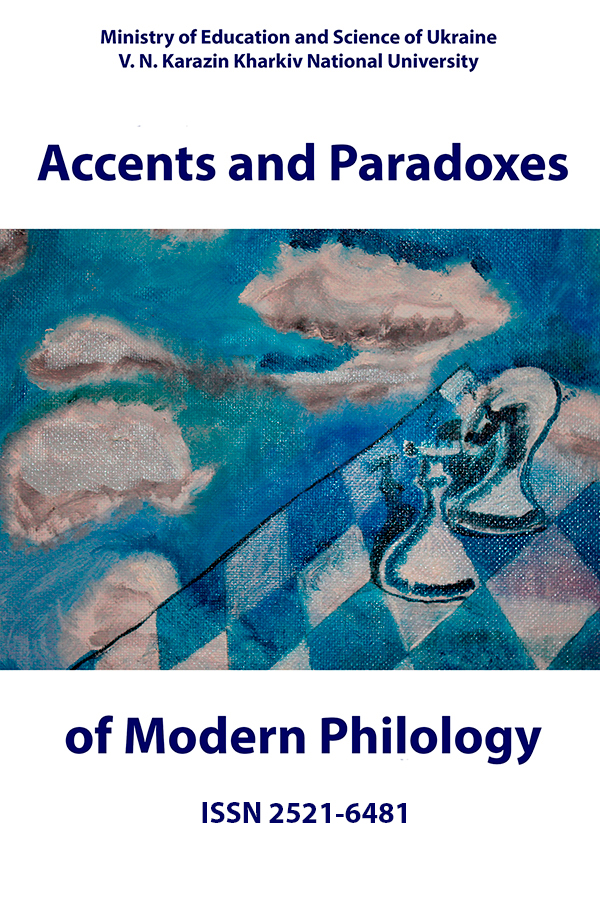Динаміка американських літературних канонів: від античної класики до «революції множинності»
Анотація
У статті розглядаються шляхи трансформації літературних канонів США у діахронічній перспективі. Основними віхами у його русі крізь час уявляються перехід від античного спадку до сучасної літератури, створюваної у метрополії (XVIII ст.); «американізація» канону, яка супроводжувалася жорсткою полемікою (XIX – початок ХХ ст.); функціонування «протоканону» на базі «благопристойної традиції» (рубіж ХІХ-ХХ ст.); складання демократично-індивідуалістичного канону навколо ключових постатей «американського ренесансу» та пізніших авторів «мейнстриму» (середина ХХ ст.); і, нарешті, «революція множинності», яка призвела до «відкриття» канону на користь представників етнічних, расових, гендерних та інших меншин (1960-1990-і рр.), а далі до сучасних змін у його жанрових параметрах і посилення культурологічних та інтермедіальних вимірів.
Завантаження
Посилання
Апенко, Е.М. (2000) Литературная критика , История литературы США. Т.IІІ. Литература середины ХІХ в. (поздний романтизм). Москва: Наследие.
Коренева, М.М. (1997) Литература ХVIII в. Введение, История литературы США. Т.I. Литература колониального периода и эпохи Войны за независимость XVII-XVIII в. Москва: Наследие.
Михед, Т.В. (2006) Пуританська традиція і література Американського Ренесансу: 1830-1860. Київ: Знання України.
Bercovitch, S. (1986) The Problem of Ideology in American Literary History, New Literary History, #12.
Bercovitch, S. (1986) Preface, Reconstructing American Literary History, Ed. S. Bercovitch. Cambridge, Mass.: Harvard Univ. Press.
Bercovitch, S. (1993) The Rites of Assent: Transformations in the Symbolic Construction of America. N.Y. & L.: Routledge.
Bloom, H. (1994) The Western Canon. The Books and School of the Ages. N.Y. : San Diego, L.: Harcourt, Brace, and Co.
The Columbia Literary History of the United States. (1988) N.Y.: Columbia Univ. Press.
D’Haen, T. (2011) How Many Canons Do We Need? World Literature, National Literature, European Literature, The Canonical Debate Today: Crossing Disciplinary and Cultural Boundaries , Ed. by L.Papadima, D. Damrosch, T. D’Haen. Amsterdam, N.Y. : Rodopi.
Doren, C. van. (1932) Towards a New Canon, The Nation. April 13. [Електронний ресурс]. – Режим доступу: http://go.galegroup.com/ps/l.do?id=GALE%7CH1420025423&v=2.1&u=lincclin_iscc&it=r&p=LitRG&sw=w
Geiger, R. (2014) The History of American Higher Education. Princeton: Princeton Univ. Press.
Guillory, J. (2010) Canon, Critical Terms for Literary Study, Ed. by J.Guillory, F.Lentrichia. Chicago: Univ. of Chicago Press.
Lauter, P. (1990) Introduction, Heath Anthology of American Literature, Ed. Paul Lauter. Lexington, Mass.: D.C.Heath & Co.
Lauter, P. (2001) From Walden Pond to Jurassic Park: Activism, Culture, and American Studies. Durham & L.: Duke Univ. Press.
Lauter, P. (2002) Preface, Heath Anthology of American Literature, Ed. P. Lauter. 4th ed. Boston-N.Y.: Houghton-Mifflin.
Levine, L. (1996) The Opening of the American Mind: Canons, Culture, and History. Boston: Beacon Press.
Matthiessen, F.O. (1969) American Renaissance: Art and Expression in the Age of Emerson and Whitman. N.Y.: Oxford UP.
Messmer, M. (2000) Reading National American Historiography Internationally. Comparative Literature. № 52:3.
Wyck, Brooks van. (1918) On Creating Usable Past. The Dial. Vol LXIX. #764. [Електронний ресурс]. – Режим доступу: http://www.archive.org/stream/dialjournallitcrit64chicrich#page/337/mode/1up




